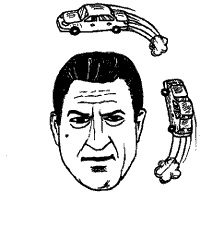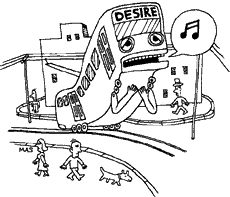
Movies
Ronin (United Artists). The only thing critics can agree on about John (The Manchurian Candidate) Frankenheimer's supposed "comeback" film is that the car chases are so phenomenal that they redefine the form. As for whether the rest of the film (in which a group of post-Cold War international mercenaries led by Robert De Niro pursues a mysterious suitcase around France) succeeds, that depends on the critic. Some call the film "empty--a joyless thrill ride" (Owen Gleiberman, Entertainment Weekly). Others find the MacGuffin-ish plot "rife with delicious ambiguity" (Michael O'Sullivan, the Washington Post). (Visit the official site.)
Urban Legend (Sony Pictures Entertainment/TriStar Pictures). A clever idea--incorporating common urban myths into a traditional horror movie--paired with so-so execution results in a lukewarm set of reviews. Despite the shock-film novelty of poodles in microwaves, critics dismiss Urban Legend as yet another Scream wannabe--long on fresh-from-TV teen cuties and short on substance or craft. In other words, "a teen-age moviegoer's dream" (Anita Gates, the New York Times) but "utterly uninspired" (Ty Burr, Entertainment Weekly). (Join an online chat about Urban Legend.)
Book
Two Cities, by John Edgar Wideman (Houghton-Mifflin). Michelle Cliff calls the latest novel from the much-lauded author of TheCattle Killing "a stunning portrait of three lives ... in the gang-colored landscape of the present" (Village Voice). Mixing intimate life stories with larger elements of Philadelphia's urban landscape such as Move, the radical back-to-Africa group that was firebombed by police in the '80s, the novel shifts seamlessly among viewpoints and time frames. Most reviewers concur with Cliff's assessment, but Richard Bernstein writes in the New York Times Book Review that the book is "so focused on darkness and degradation as to be demagogic in its effect" and calls Wideman's version of history "distorted" and "troubling." (Click here for Walter Kirn and Brent Staples' discussion of Two Cities in Slate's "The Book Club.")

Opera
A Streetcar Named Desire (performed by the San Francisco Opera). Flawed but not without merit, classical phenomenon André Previn's operatic adaptation of the Tennessee Williams play is called "an unexpected letdown" (Terry Teachout, Time). Noting that the "formidable reputation" of the play is "itself an obstacle" (Alex Ross, The New Yorker), critics seem apologetic for their negative reviews. After describing the production as heavy-handed in its use of melodrama, or the music clichéd, each reviewer makes a point of singling out a few elements of the show for praise. Newsweek's Katrine Ames is the opera's most passionate advocate, calling the score "rich with color, by turns lush, frantic, heartbreaking, even funny." (Here is a calendar of performance dates.)
Music
Painted From Memory, by Elvis Costello with Burt Bacharach (Mercury). Expecting kitschy nouveau-lounge, critics are pleased to find a "sublime and subtle beauty" in the heartfelt, rich album from this unlikely pair (David Browne, Entertainment Weekly). Costello's lyrics are pared-down and unusually taut, and "Bacharach's arrangements for a 24-piece orchestra should make Babyface weep in envy" (Greg Kot, the Chicago Tribune). Several critics point out that Costello's voice is not quite up to the task presented by Bacharach's complex melodies, but this is deemed only a minor irritation. (Listen to a clip from the album.)
Television
Felicity (The WB; Tuesdays, 9 p.m. ET/PT). Early reviews for this sensitive, intelligent, girl-goes-to-college drama--by far the most "hotly anticipated new show" of the season (Bruce Newman, the Los Angeles Times)--are mildly approving, but the show doesn't come close to meeting the high expectations created by the pre-season buzz. Time's James Collins calls it "pretty good, gooey, yearning, adolescent fun," and Entertainment Weekly's Ken Tucker calls it "a solid weekly soap opera." Slate's Sarah Kerr is more positive than most, placing it far above Ally McBeal (a common comparison) for the way it "adores its confused characters and burrows inside their heads to find a deeper humor, warmer but also more raw." (Read the rest of Kerr's review.)
Art
"From Van Eyck to Bruegel: Early Netherlandish Painting in the Metropolitan Museum of Art" (New York). Critics gush over the Met's exhibit of Renaissance paintings from the Netherlands. (The paintings are from the Met's collection but are ordinarily scattered around the museum.) The straightforward chronological order and detailed explanations of the workshop system of the time, coupled with the high caliber of the art, makes for a show that is "both intellectually stimulating and unexpectedly poignant" (Mark Stevens, New York). This "dazzling show of strength" is a testament to the "unrivalled genius of the Netherlandish artists who invented the oil paint medium" (Holland Cotter, the New York Times). (Find out more about the exhibition.)
Recent "Summary Judgment" columns
Report--The Starr Report;
Book--Bag of Bones, by Stephen King;
Book--Model Behavior, by Jay McInerney;
Book--Birds of America, by Lorrie Moore;
Movie--Rush Hour;
Movie--Permanent Midnight;
Movie--A Soldier's Daughter Never Cries.
Movie--Rounders;
Movie--One True Thing;
Movie--Simon Birch;
Movie--Touch of Evil;
Book--Anne Frank, by Melissa Müller;
Music--Mechanical Animals, by Marilyn Manson;
Music--Teatro, by Willie Nelson.
Movie--Without Limits;
Movie--Knock Off;
Movie--Next Stop Wonderland;
Death--Akira Kurosawa;
Book--The Professor and the Madman, by Simon Winchester;
Book--At Home in the World, by Joyce Maynard.
Movie--Blade;
Movie--Why Do Fools Fall in Love;
Movie--54;
Book--The Farming of Bones, by Edwidge Danticat;
Music--The Miseducation of Lauryn Hill, by Lauryn Hill.
--Eliza Truitt